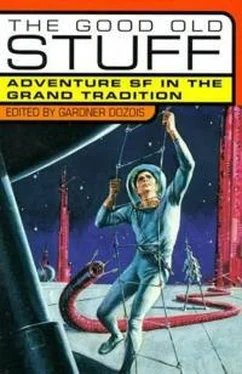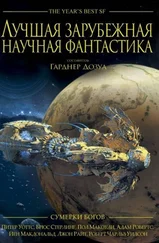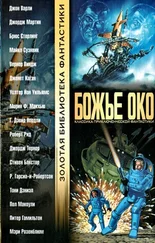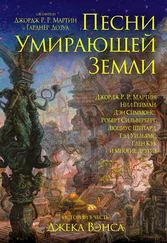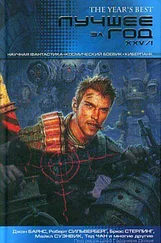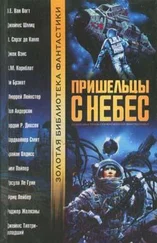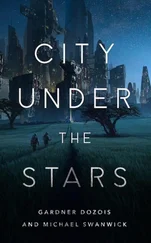Гарднер Дозуа - The Good Old Stuff
Здесь есть возможность читать онлайн «Гарднер Дозуа - The Good Old Stuff» весь текст электронной книги совершенно бесплатно (целиком полную версию без сокращений). В некоторых случаях можно слушать аудио, скачать через торрент в формате fb2 и присутствует краткое содержание. Год выпуска: 1998, ISBN: 1998, Издательство: St. Martin's Griffin, Жанр: Фантастика и фэнтези, на английском языке. Описание произведения, (предисловие) а так же отзывы посетителей доступны на портале библиотеки ЛибКат.
- Название:The Good Old Stuff
- Автор:
- Издательство:St. Martin's Griffin
- Жанр:
- Год:1998
- ISBN:0-312-19275-4
- Рейтинг книги:3 / 5. Голосов: 1
-
Избранное:Добавить в избранное
- Отзывы:
-
Ваша оценка:
- 60
- 1
- 2
- 3
- 4
- 5
The Good Old Stuff: краткое содержание, описание и аннотация
Предлагаем к чтению аннотацию, описание, краткое содержание или предисловие (зависит от того, что написал сам автор книги «The Good Old Stuff»). Если вы не нашли необходимую информацию о книге — напишите в комментариях, мы постараемся отыскать её.
The Good Old Stuff — читать онлайн бесплатно полную книгу (весь текст) целиком
Ниже представлен текст книги, разбитый по страницам. Система сохранения места последней прочитанной страницы, позволяет с удобством читать онлайн бесплатно книгу «The Good Old Stuff», без необходимости каждый раз заново искать на чём Вы остановились. Поставьте закладку, и сможете в любой момент перейти на страницу, на которой закончили чтение.
Интервал:
Закладка:
Jamieson proceeded on the positive assumption that he had one decisive advantage over the Rull survivors: he knew when it was safe to touch metal. They would have to rig up elaborate devices before they could dare move.
In the weapon control room he worked with energy cutting tools, hurriedly but effectively. His purpose: to make certain that the gigantic blasters could not be fired until the weapon control wiring was totally repaired.
That job done, he headed for the nearest lifeboat. The Ploian joined him as he was edging his way through an opening.
“There’re some Rulls that way,” the Ploian warned. “Better go this way.” They finally entered a Rull lifeboat without mishap. A few minutes later Jamieson launched the small craft, but five days went by before they were picked up.
The high Aaish of Yeell was not on the ship to which Jamieson had been taken as a captive. And so he was not among the dead, and, indeed, did not learn of the escape of the prisoner for some time. When the information was finally brought to him, his staff took it for granted that he would punish the Rull survivors of the wrecked battleship.
Instead, he said thoughtfully, “So that was the enemy? A very powerful being.”
He silently considered the week of anguish he had endured. He had recovered almost all of his perceptive powers—so he was able to have a very unusual thought for an individual of his high estate.
He said, using the light-wave communicator, “I believe that this is the first time that a Prime Leader has visited the battlefront. Is this not correct?”‘ It was correct. A Super-General had come from rear headquarters to the “front lines.” Top brass had come out of the sheltered and protected home planet and risked a skin so precious that all of Ria shuddered anxiously when the news was released.
The greatest Rull continued his speculations: “It would seem to me that we have not received the most accurate intelligence about human beings.
There appears to have been an attempt to underestimate their abilities, and while I commend the zeal and courage of such attempts, my reaction is that this war is not likely to be successful in any decisive way.
It is therefore my conclusion that the Central Council reexamine the motives for the continuation of the battle effort. I do not foresee an immediate disengagement, but it might well be that the fighting could gradually dissipate, as we assume a defensive position in this area of space, and perhaps turn our attention to other galaxies.”
Far away, across light-years of space, Jamieson was reporting to an august body, the Galactic Convention: “I feel that this was a Very Important Person among the Rulls; and, since I had him under complete hypnosis for some time, I think we should have a favorable reaction. I told him that the Rulls were underestimating human beings, and that the war would no t be successful, and I suggested that they turn their attention to other galaxies.”
Years were to pass before men would finally be certain that the Rull-human war was over. At the moment, the members of the convention were fascinated by the way in which a mind-reading baby ezwal had been used to contact an invisible Ploian; and of how t his new ally had been the means of a human being escaping from a Rull battleship with such vital information as Jamieson had brought with him.
It was justification for all the hard years and patient effort that men had devoted to a policy of friendship with alien races. By an overwhelming majority the convention created for Jamieson a special position which would be called: Administrator of Races.
He would return to Carson’s Planet as the ultimate alien authority, not only for ezwals, but as it turned out, the wording of his appointment was later interpreted to mean that he was Man’s negotiator with the Rull.
While these matters developed, the galactic-wide Rull-human war ended.
The Second Night Of Summer
James H. Schmitz
Although he lacked van Vogt’s paranoid tension and ornately Byzantine plots, the late James H. Schmitz was considerably better at people than van Vogt was, crafting even his villains as complicated, psychologically complex, and non-stereotypical characters, full of surprising quirks and behaviors that you didn’t see in a lot of other Space Adventure stuff. And his universes, although they come with their own share of monsters and sinister menaces, seem as if they would be more pleasant places in which t o live than most Space Opera universes, places where you could have a viable, ordinary, and decent life once the plot was through requiring you to battle for existence against some Dread Implacable Monster; Schmitz even has sympathy for the monsters, who are often seen in the end not to be monsters at all, but rather creatures with agendas and priorities and points-of-view of their own, from which perspectives their actions are justified and sometimes admirable—a tolerant attitude almost unique amidst the Space Adventure tales of the day, most of which were frothingly xenophobic.
Similarly, Schmitz was decades ahead of the curve in his portrayal of female characters—years before the Women’s Movement of the ‘70s would come along to raise the consciousness of SF writers (or attempt to), Schmitz was not only frequently using women as the heroines in swashbuckling tales of interplanetary adventure—itself almost unheard of at the time—but he was also treating them as the total equal of the male characters, every bit as competent and brave and smart (and ruthless, when needs be), without saddling them with any of the “female weaknesses”—like an inclination to faint or cower under extreme stress, and/or seek protection behind the muscular frame of the Tough Male Hero) that would mar the characterization of women by some writers f or years to come. (The Schmitz Woman, for instance, is every bit as tough and competent as the Heinlein Woman—who, to be fair, isn’t prone to fainting in a crisis either—but without her annoying tendency to think that nothing in the universe is as important as marrying Her Man and settling down to have as many babies as possible.) In the vivid and suspenseful story that follows, for instance, the hero of the piece is not only a woman, but an old woman, named Grandma Wannattel—a choice that most adventure writers wouldn’t even make now, in 1998, let alone in 1950, which is when Schmitz made it!
The novel The Witches of Karres is usually thought of as Schmitz’s best work, but I myself am fond of the “Vega” stories—one of which is “The Second Night of Summer”—which were collected in the book Agent of Vega, a book that is long out-of-print, alas, but one which—if you can find it—delivers as pure a jolt of Widescreen Space Opera Sense Of Wonder as can be found anywhere. Also atypically among writers of Space Adventure, Schmitz did most of his best work at short lengths, most of it for Astounding (and later for Analog, after the magazine had changed its name) and for Galaxy including such memorable stories as “Grandpa,” “Balanced Ecology,” “Lion Loose .... ““Greenface,” “The Searcher,” “The Winds of time,” “The Custodians,” and dozens of others, plus a large number of stories about the adventures of a PSI-powered teenager, Telzey Amberdon. Schmitz’s stories have been collected in A Nice Day For Screaming and Other Tales of The Hub, A Pride of Monsters , and, most recently, the posthumous collection The Best of James H. Schmitz ; the “Telzey Amberdon” stories have been collected in The Universe Against Her and The Telzey Toy . Schmitz’s other books include The Demon Breed, A Tale of Two Clocks , and The Eternal Frontiers .
Most of Schmitz’s work is out-of-print, although copies of The Witches of Karres still show up in used bookstores with some frequency. Your best choice of sampling his work would probably be his most recent book, published in 1991, The Best of James H. Schmitz , which does contain several of his best stories—you could try ordering it from the publisher, NESFA Press (NESFA PRESS, P.O. Box 809, Framingham, MA 97101-0203; www. nesfa.org), although I have no idea whether they have any left in stock or not; the price was $18.95, but you’d better write first and ask for information.
Читать дальшеИнтервал:
Закладка:
Похожие книги на «The Good Old Stuff»
Представляем Вашему вниманию похожие книги на «The Good Old Stuff» списком для выбора. Мы отобрали схожую по названию и смыслу литературу в надежде предоставить читателям больше вариантов отыскать новые, интересные, ещё непрочитанные произведения.
Обсуждение, отзывы о книге «The Good Old Stuff» и просто собственные мнения читателей. Оставьте ваши комментарии, напишите, что Вы думаете о произведении, его смысле или главных героях. Укажите что конкретно понравилось, а что нет, и почему Вы так считаете.
